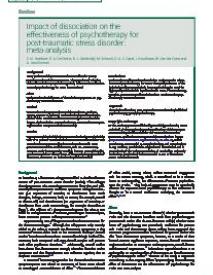Impact of dissociation on the effectiveness of psychotherapy for post-traumatic stress disorder : meta-analysis
Background: any patients with post-traumatic stress disorder (PTSD) experience dissociative symptoms. The question of whether these dissociative symptoms negatively influence the effectiveness of psychotherapy for PTSD is unresolved.
Aims: To determine the influence of dissociative symptoms on psychotherapy outcome in PTSD.
Method: We conducted a systematic search in Cochrane, Embase, PILOTS, PsycINFO, PubMed and Web of Science for relevant clinical trials. A random-effects meta-analysis examined the impact of dissociation on psychotherapy outcome in PTSD (preregistered at Prospero CRD42018086575).
Results: Twenty-one trials (of which nine were randomised controlled trials) with 1714 patients were included. Pre-treatment dissociation was not related to treatment effectiveness in patients with PTSD (Pearson’s correlation coefficient 0.04, 95% CI −0.04 to 0.13). Between-study heterogeneity was high but was not explained by moderators such as trauma focus of the psychotherapy or risk of bias score. There was no indication for publication bias.
Conclusions: We found no evidence that dissociation moderates the effectiveness of psychotherapy for PTSD. The quality of some of the included studies was relatively low, emphasising the need for high-quality clinical trials in patients with PTSD. The results suggest that pre-treatment dissociation does not determine psychotherapy outcome in PTSD.
Geachte bezoeker,
De informatie die u nu opvraagt, kan door psychotraumanet niet aan u worden getoond. Dit kan verschillende redenen hebben,
waarvan (bescherming van het) auteursrecht de meeste voorkomende is. Wanneer het mogelijk is om u door te verwijzen naar de bron
van deze informatie, dan ziet u hier onder een link naar die plek.
Als er geen link staat, kunt u contact opnemen met de bibliotheek,
die u verder op weg kan helpen.
Met vriendelijke groet,
Het psychotraumanet-team.
In: BJPsych Open ; ISSN: 2056-4724 | 6 | 3 | e53
https://doi.org/10.1192/bjo.2020.30


